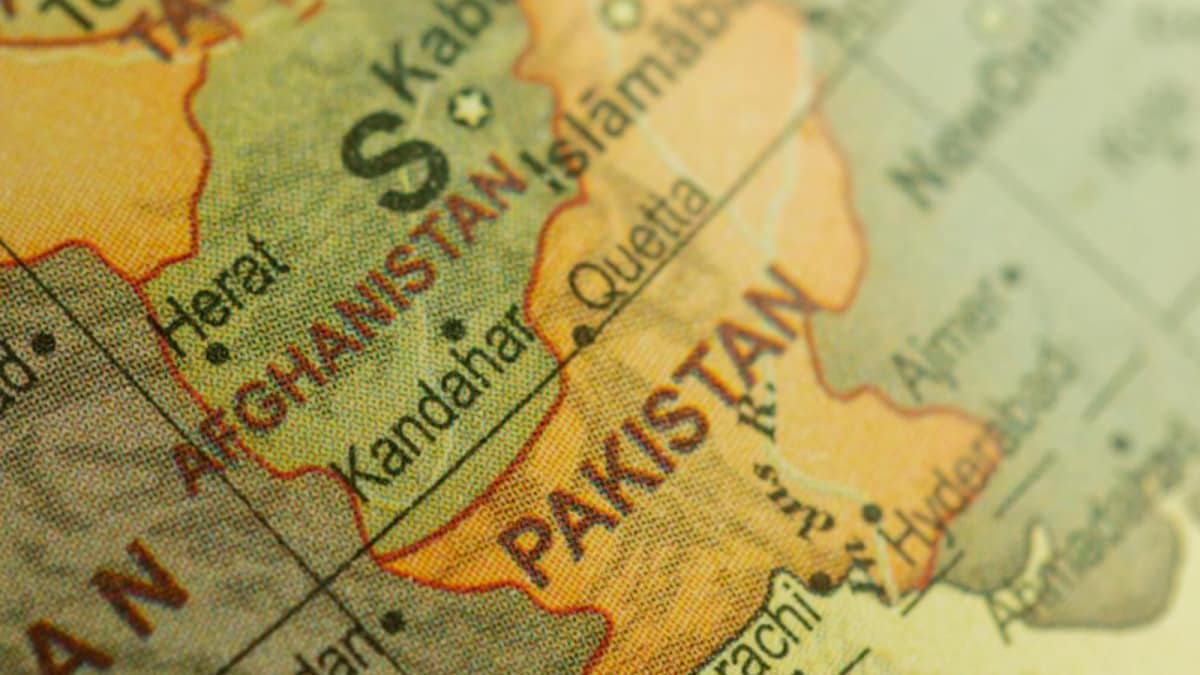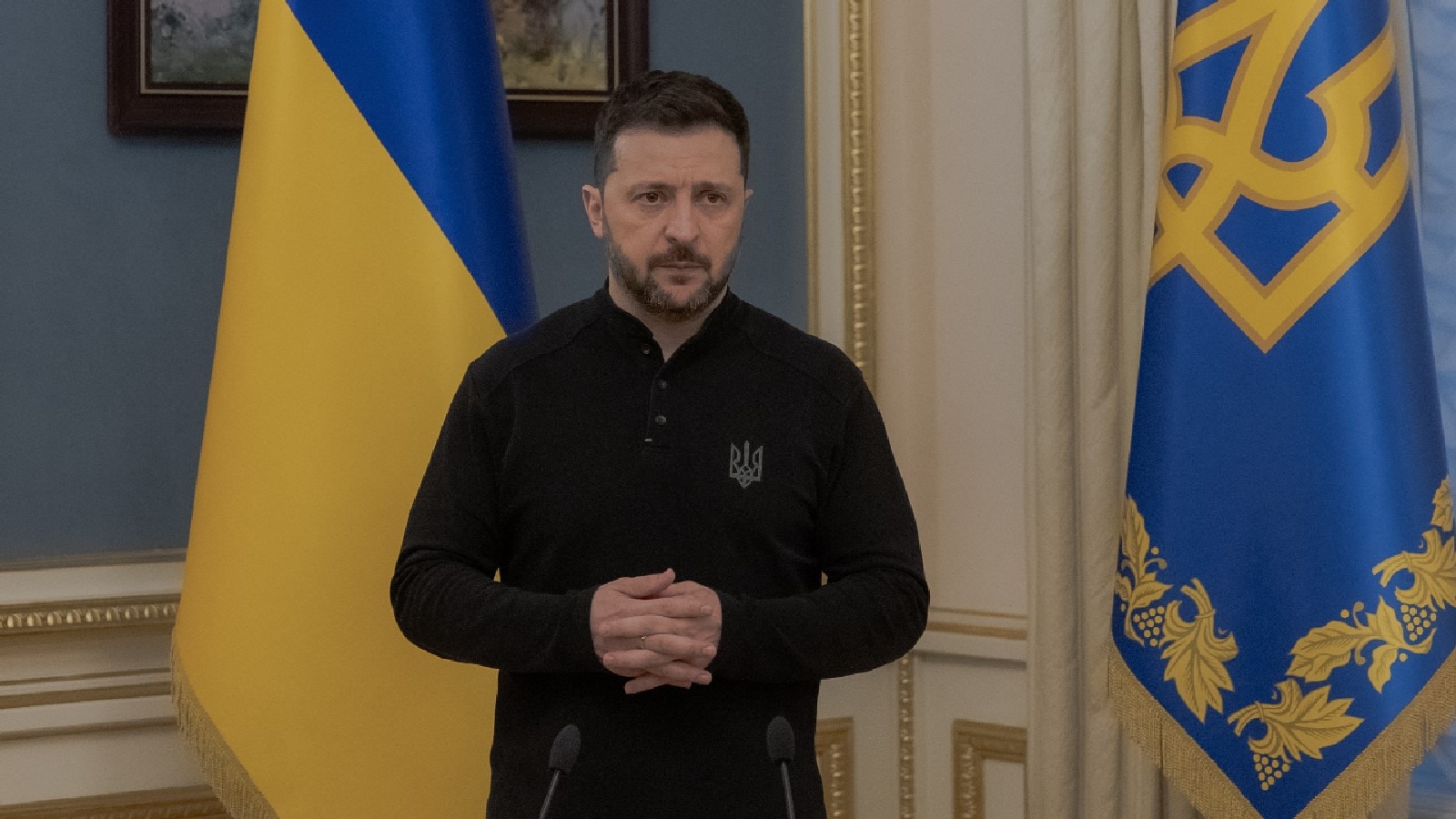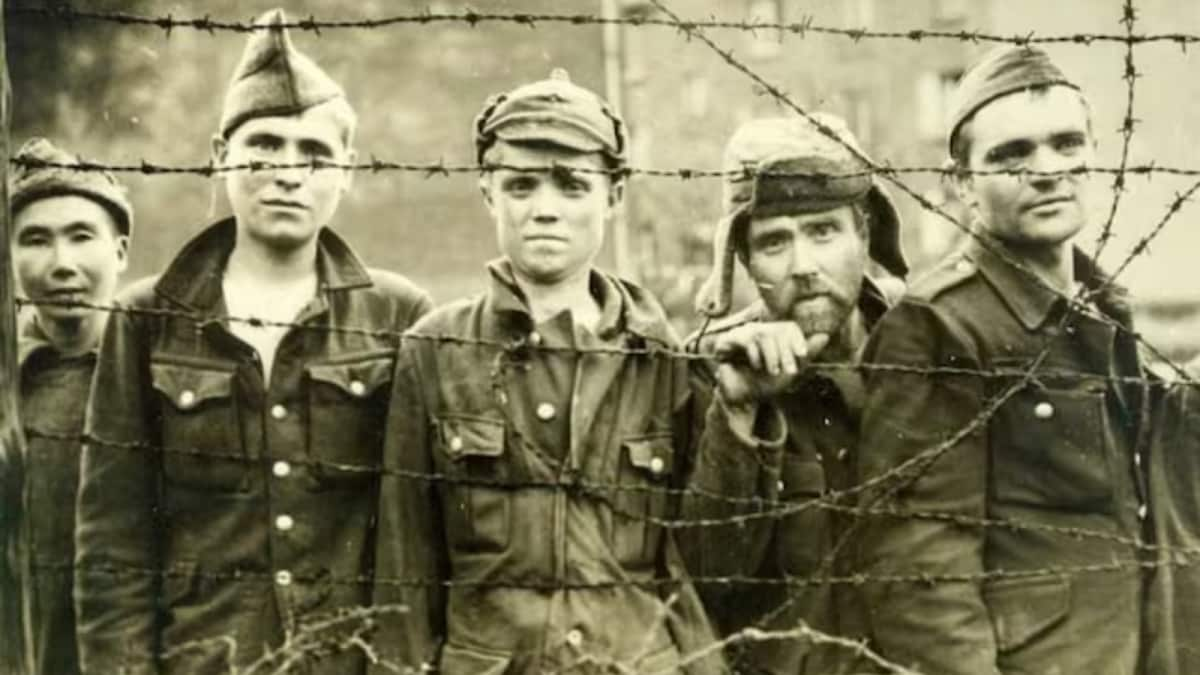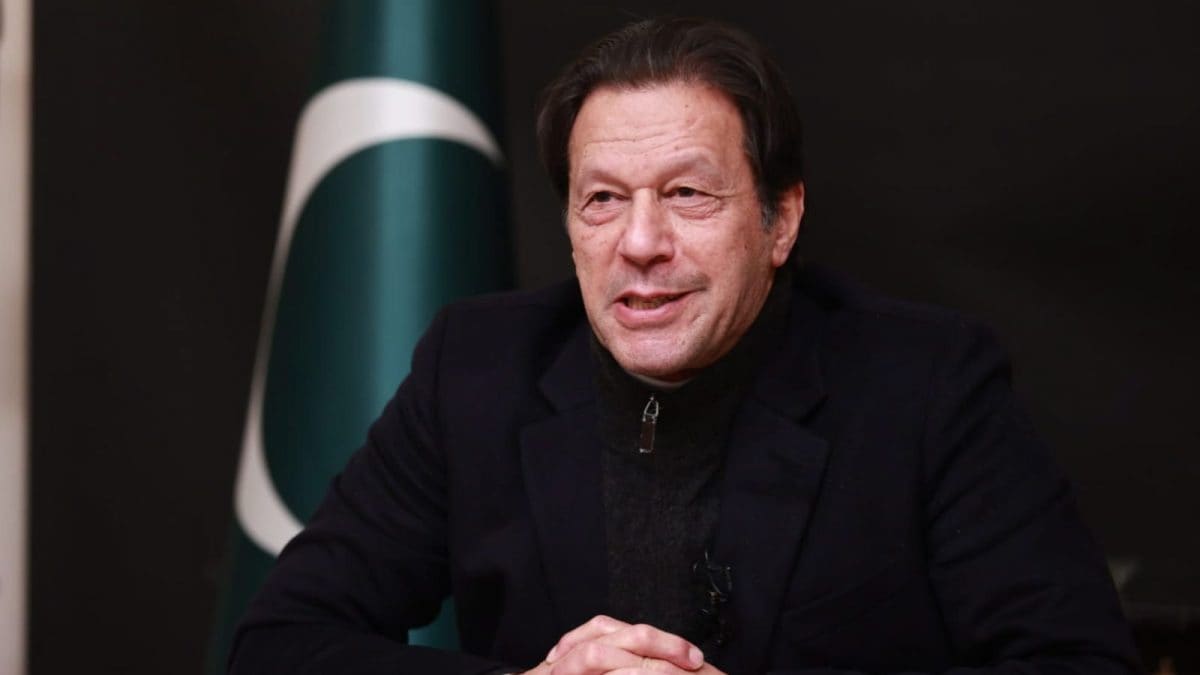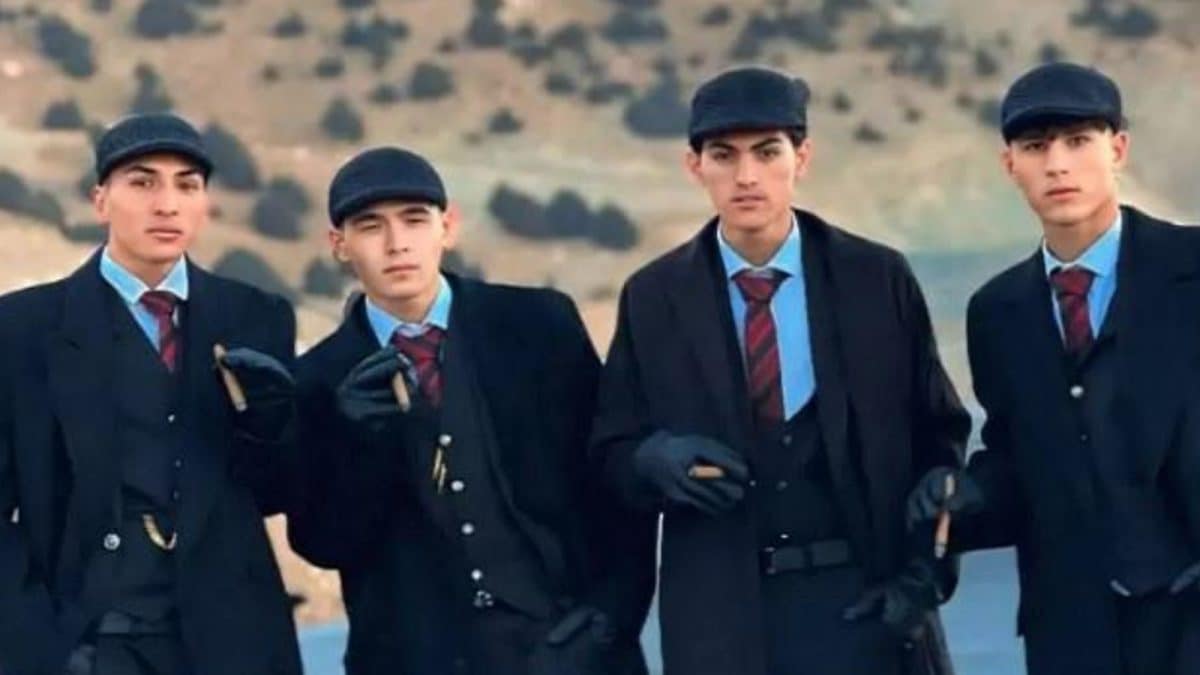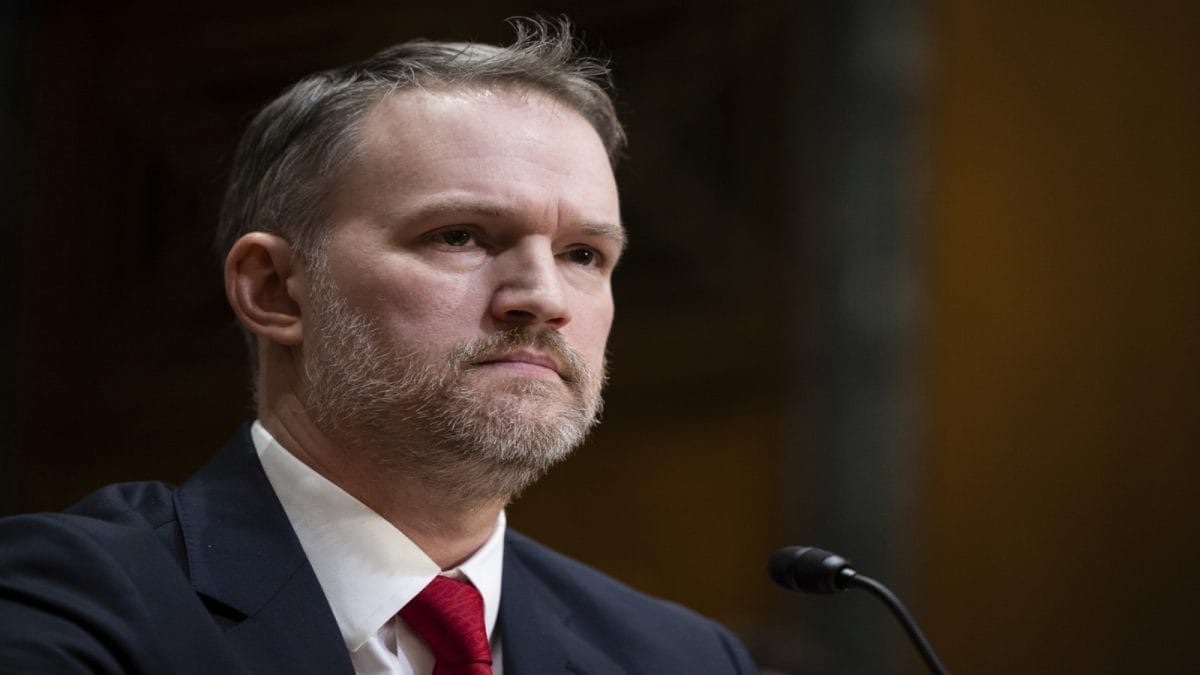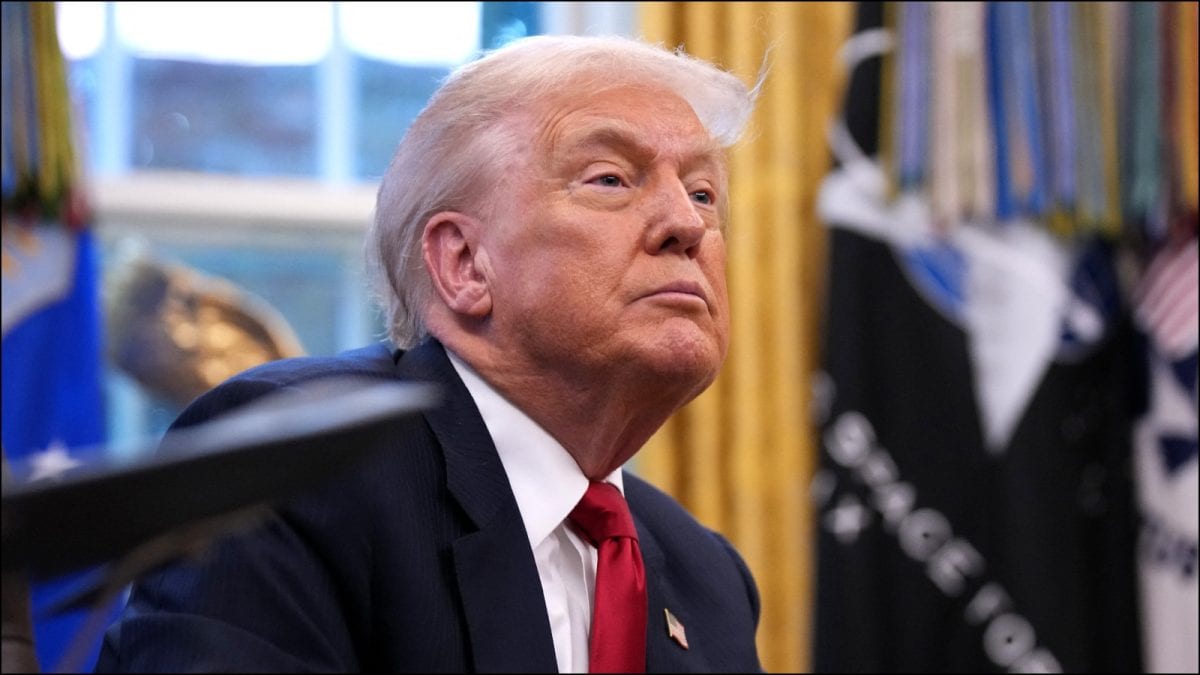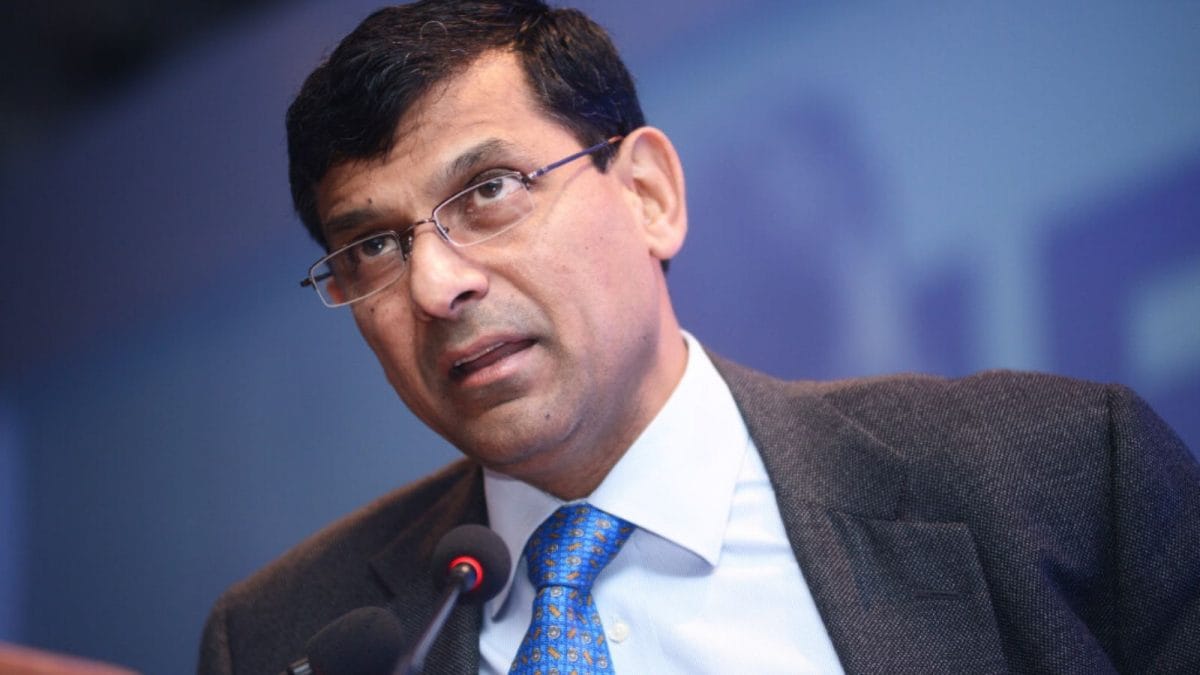World must "honour 1.5C", small island states insist
Small island states have described the 1.5C limit for global heating as “a lifeline” and demanded that the world honours it, amid increasing gloom that the symbolic target has already been breached.
“Small island states are here to demand we honour 1.5,” Toiata Apelu-Uili, mitigation coordinator for the Alliance of Small Island States (Aosis), was quoted as saying by the Reuters news agency.
“It is not a political slogan. This is a lifeline for our survival, for our small islands. We’re here because our survival, our people, our lives are not negotiable.”

Apelu-Uili, who travelled for two days to get to Belem from Samoa, spoke at a side event on day one of Cop30, where representatives of small island states offered delegates a start reminder of what failure at the climate talks looks like.
“Hurricane Melissa slammed into Jamaica a week-and-a-half ago and every single Jamaican now knows the word catastrophic,” said UnaMay Gordon, a former director of climate change for the Jamaican government and adviser to the Caribbean Community Climate Change Center, which coordinates climate action.
The strongest ever storm to hit Jamaica left dozens dead and caused billions of dollars worth of damage, roughly equivalent to 28% to 32% of last year’s gross domestic product, according to the island’s prime minister.
“We lost cultural heritage, 300-year-old churches are lost. A part of our identity was lost with it. People are hurting,” Gordon told reporters.
Scientists say that breaching 1.5C would lead to several irreversible changes, like melting ice caps driving faster sea level rises of the kind that supercharged the winds driving Hurricane Melissa. Antonio Guterres, the UN secretary general, last week described its breaching as a “moral failure and deadly negligence”.
Key events Show key events only Please turn on JavaScript to use this feature
We’re going to wind up the blog for the day now. After the conference reached agreement on the agenda, the notable events today included:
Kayapo chief Raoni, Brazil’s most prominent indigenous leader, has urged the country’s government to empower indigenous peoples to preserve the Amazon rainforest
Removing carbon from the atmosphere will be necessary to avoid catastrophic tipping points, one of the world’s leading scientists Johan Rockström has warned
California will prioritise green tech and climate, governor Gavin Newsom told Cop30
Small island states have described the 1.5C limit for global heating as “a lifeline” and demanded that the world honours it
For the first time in the history of these annual UN climate talks, the US has not sent a single official delegate, an analysis by Carbon Brief has confirmed
“Ciao, bambino!” was the message Christiana Figueres, former executive secretary of the United Nations framework convention on climate change, had for the US
And Cop32 will be hosted in Addis Ababa, the capital of Ethiopia, Reuters reports.
It’s been a pleasure and we look forward to seeing you all tomorrow!
Dharna Noor
More than 100 people gathered outside the Cop29 venue on Tuesday evening calling for an end to Israel’s siege on Gaza, reports my colleague Dharna Noor.
“Stop, stop ecocide,” they chanted. “Stop, stop genocide.”
At the UN climate talks, some activists are calling for Israel to be removed from the United Nations Framework Convention on Climate Change. “A state committing genocide and apartheid cannot participate in the UNFCCC negotiations without threatening their credibility,” one activist said, noting that UN bodies have said Israel is committing genocide in Gaza.
The organizers also called for an energy embargo on Israel, blocking the fuel that sustains the country. As of November 10, the latest figures from the Palestinian Ministry of Health in Gaza, confirm that at least 69,ooo people have been killed. Two thirds of Gaza’s farmland has been destroyed by Israeli forces.
Many at the protest said they had been directly impacted by Israel’s war on Gaza. “The Israeli regime has killed my entire father’s side of my family and has displaced my entire mother’s side,” said Mohammed Usrof of the Palestinian Institute for Climate Strategy.
Organizers said they were not permitted to have the protest in the halls of Cop29. This has not deterred the movement, said Jamal Juma of the Boycott Divest Sanctions movement and Stop the Wall Coalition.
“Our voice is louder than their voice,” he said.
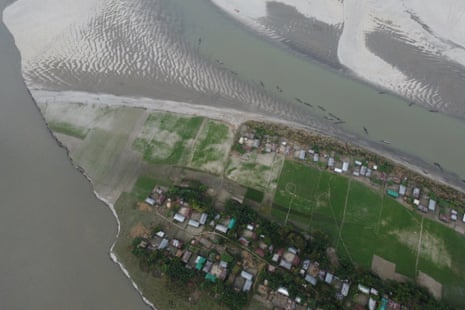
Meanwhile, in case you missed this powerful piece yesterday, Reuters reported on how land erosion is affecting people in Bangladesh.
Every year, hundreds of families in northern Bangladesh’s Kurigram district face the same fate. As riverbanks collapse, people lose not only their homes but also their land, crops, and livestock. The Brahmaputra, Teesta, and Dharla rivers — once lifelines for millions — have become unpredictable, eroding land faster than ever before.
The chars — sandy, shifting islands scattered across the country’s northern plains — are among the most fragile places in Bangladesh. Families rebuild again and again, only for the river to take everything they have.

It appears there has been some kind of mix up and Gavin Newsom, the California governor, won’t actually be speaking at Cop30 for another hour or so. Sorry about that!
Kayapo chief Raoni criticises Amazon infrastructure projects
Brazil’s most prominent indigenous leader has urged the country’s government to empower indigenous peoples to preserve the Amazon rainforest, Reuters reports.
In an interview with the news agency, Raoni Metuktire warned that plans to build infrastructure in Amazon region – including proposed highways, rail projects and oil wells – are a direct threat to the forest and its people, and would harm people across the world.
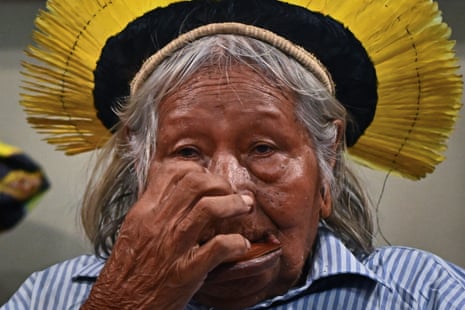
Speaking in his native language of Kayapo, with his grandson translating, Chief Raoni told Reuters:
These projects destroy rivers and lands and they are continuing to do it. I don’t like it. I had said long ago that there will be many very bad consequences for us.
It will be very bad for us. And for you too. You are bringing the consequences upon yourselves.
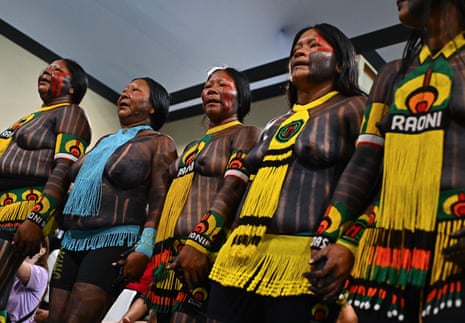
Dozens of indigenous leaders have travelled to Belém for this year’s UN Cop30 climate summit, which had been billed as the “Amazonian Cop”, with promises of greater representation for indigenous peoples.
A key demand of indigenous groups worldwide is for a greater say in how the lands they live on are managed. Chief Raoni urged Brazil’s government to give legal protections to tribal lands. He said:
I had spoken to Lula when we met before he took office and told him that it was necessary to do it so, that finally my people, my relatives, could have their lands by right.
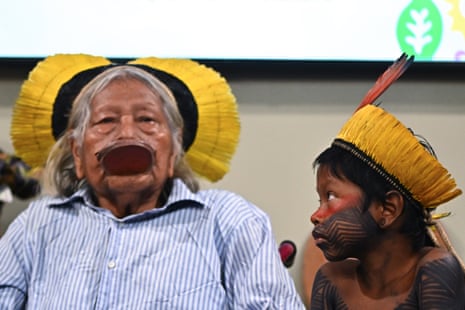
He also criticised a number of projects, including a plan to pave a highway through the forest, and a license granted a few weeks ago allowing Brazil’s state-run oil company Petrobras to explore for offshore oil 500km from the mouth of the Amazon River.
Raoni is no stranger to international environmental summits. He attended the 1992 Earth Rio Summit, which produced the UN climate treaty under the auspices of which the Cop summits take place. He was downbeat on progress since then.
When there were forests everywhere, I went to that meeting to talk about the forest. I said that our forest had to be preserved. And even so, they continued to destroy everything.
You non-Indigenous people, perhaps you should have listened and thought about your children, thought about your grandchildren, so that the forest can live and contribute to the lives of new generations, of your grandchildren.
California governor Gavin Newsom will be speaking at Cop30 in a few minutes.
Embedded at the top of the blog is a live feed of the summit’s session on adaptation, cities and climate innovation, at which Newsom will speak alongside Christiana Figueres, the former UN climate chief.
Newsom is in Belem representing America Is All In and the US Climate Alliance, two organisations trying to keep America relevant in the fight against climate breakdown.
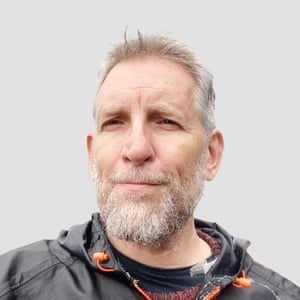
Jonathan Watts
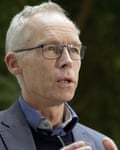
Removing carbon from the atmosphere will be necessary to avoid catastrophic tipping points, one of the world’s leading scientists has warned, as even in the best-case scenario the world will heat by about 1.7C, writes Jonathan Watts, the Guardian’s global environment writer.
Johan Rockström of the Potsdam Institute for Climate Impact Research, who is one of the chief scientific advisers to the UN and the Cop30 presidency, said 10bn tonnes of carbon dioxide needed to be removed from the air every year even to limit global heating to 1.7C (3.1F) above preindustrial levels.
To achieve this through technological means, such as direct air capture, would require the construction of the world’s second biggest industry, after oil and gas, and require expenditures of about a trillion dollars a year, scientists said. It would need to be done alongside much more drastic emissions cuts and could also have unintended consequences.
Rockström was among several leading climate experts who spoke at a first public event for the Science Council, which was set up as an advisory body by the Belém Cop30 presidency.
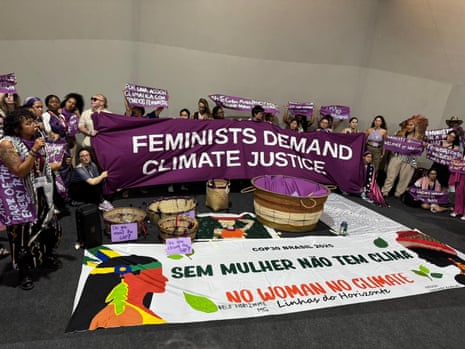

California will prioritise green tech and climate, governor tells Cop30
California will continue to prioritise green technology and climate policy, the state’s governor, Gavin Newsom, told delegates at Cop30, in defiance of Donald Trump’s opposition to the green agenda.
“The United States of America is as dumb as we want to be on this topic, but the state of California is not,” Newsom said, in the first of several scheduled appearances at the U.N. climate summit in Brazil.
“And so we are going to assert ourselves, we’re going to lean in, and we are going to compete in this space.”
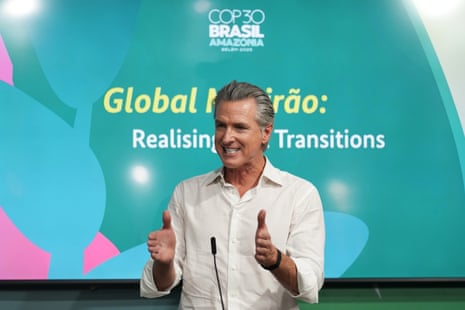
Newsom, one of Trump’s most strident opponents, who has for months been teasing a run for the White House in 2028, arrived this week in Belém with a message that his state will continue to be a “reliable partner” on green policy.
Though California is just one of 50 US states, the size of its economy – the world’s fourth-largest – makes it a key player in influencing markets and energy policy.
Newsom is expected to meet with officials from some of the 195 governments taking part in Cop30, as well as a series of subnational leaders, including the governor of Brazil’s state of Para, the location of the summit.
Trump, who has declared climate change a hoax, made withdrawing the US from the Paris Agreement one of his first acts on resuming the presidency at the beginning of this year, and he has not sent a single official to this year’s climate summit.
“The reason I’m here is in the absence of leadership coming from the United States,” Newsom said at an investors summit in Brazil’s financial hub of Sao Paulo on Monday, according to Reuters. “This vacuum, it’s rather jaw-dropping.”
Visitors to the Cop30 climate summit may have tried the Amazon’s famous acai berry before. But they are likely to be in for a surprise when they taste its authentic preparation in Belém, according to a report by the Associated Press.
The US-based news agency reports that acai bowls served by local vendors in the Amazonian city are served – true to the dish’s rainforest roots – unadulterated and without sugar.
Punters more used to the frozen and sweetened acai cream sold in other countries, and elsewhere in Brazil, are finding it an acquired taste.
“I can’t say this is bad and I totally respect the cultural importance of it, but I still prefer the ice creamy version,” Catherine Bernard, from France, told AP as she tasted a traditional acai berry bowl in downtown Belem on Thursday.

Indigenous people in the Amazon have cultivated the acai berry for hundreds of years. The nutrient-rich fruit is blended into a thick liquid and served at room temperature with a sprinkling of tapioca flour.
Tainá Marajoara, an activist and owner of a restaurant, told AP: “The acai coming from Indigenous people is the food when there’s no food. It was never a drink or an extra. It can be the main course for us.”
Marajoara’s restaurant at the Cop3- pavilion charges 25 Brazilian reais ($5) for a bowl, about the same as bowls in other parts of Brazil that use industrially processed and sweetened acai cream, often with toppings.
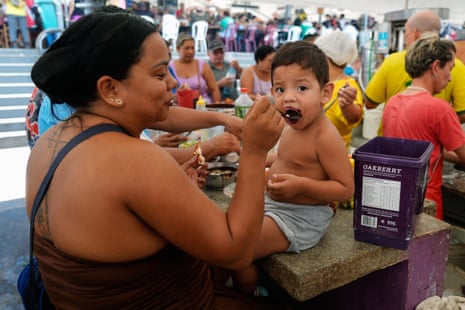
World must "honour 1.5C", small island states insist
Small island states have described the 1.5C limit for global heating as “a lifeline” and demanded that the world honours it, amid increasing gloom that the symbolic target has already been breached.
“Small island states are here to demand we honour 1.5,” Toiata Apelu-Uili, mitigation coordinator for the Alliance of Small Island States (Aosis), was quoted as saying by the Reuters news agency.
“It is not a political slogan. This is a lifeline for our survival, for our small islands. We’re here because our survival, our people, our lives are not negotiable.”

Apelu-Uili, who travelled for two days to get to Belem from Samoa, spoke at a side event on day one of Cop30, where representatives of small island states offered delegates a start reminder of what failure at the climate talks looks like.
“Hurricane Melissa slammed into Jamaica a week-and-a-half ago and every single Jamaican now knows the word catastrophic,” said UnaMay Gordon, a former director of climate change for the Jamaican government and adviser to the Caribbean Community Climate Change Center, which coordinates climate action.
The strongest ever storm to hit Jamaica left dozens dead and caused billions of dollars worth of damage, roughly equivalent to 28% to 32% of last year’s gross domestic product, according to the island’s prime minister.
“We lost cultural heritage, 300-year-old churches are lost. A part of our identity was lost with it. People are hurting,” Gordon told reporters.
Scientists say that breaching 1.5C would lead to several irreversible changes, like melting ice caps driving faster sea level rises of the kind that supercharged the winds driving Hurricane Melissa. Antonio Guterres, the UN secretary general, last week described its breaching as a “moral failure and deadly negligence”.
Hello this is Damien Gayle, once again taking the reins on the Guardian’s live coverage of the Cop30 circus in Belém, Brazil, with thanks to Ajit for bringing you through the last few hours.
As ever, if you have any suggestions about what we should be covering on here please do feel free to drop me a line at damien.gayle@theguardian.com.
Here are a few photos of campaigners protesting today at Cop30. They include calls for a “just transition” away from fossil fuels, feminists demanding climate justice, and a push to get oil and gas lobbyists out of UN climate talks.


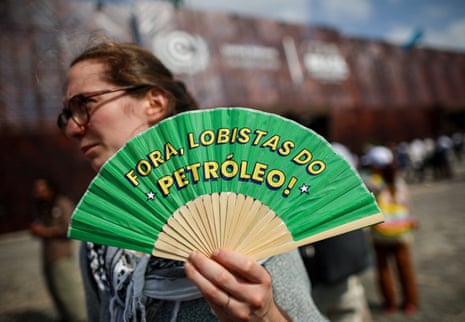

Oliver Milman
For the first time in the history of these annual UN climate talks, the US has not sent a single official delegate, an analysis by Carbon Brief has confirmed.
The US is in rare company at this year’s Cop summit in Belem, with only Afghanistan, Myanmar and San Marino also sending no delegates to the Amazon. Carbon Brief drew the numbers from the provisional lists of delegates published by the United Nations Framework Convention on Climate Change (UNFCCC).
The lack of US representation is in line with the Trump administration confirming it would send no high-level officials to the talks, after the president had lambasted concerns over the climate crisis as a “con job” and a “hoax.”
Trump has spent recent months cajoling other countries to purchase US oil and gas, weakening their climate policies in order to do so. Despite the American absence, there has been nervousness in Belem that the administration will attempt to try to derail aspects of the climate talks by putting pressure on other countries from afar.
Overall, Cop30 is among the largest ever of the climate summits in terms of delegates, second only to Dubai in 2023. More than 56,000 people registered to come to Belem, near the mouth of the Amazon river, despite worries about exorbitant accommodation costs.
The figures are so far provisional, as some registered delegates will have not ultimately made the trip. The UNFCCC will release the final list at the end of the conference.

 4 weeks ago
4 weeks ago

